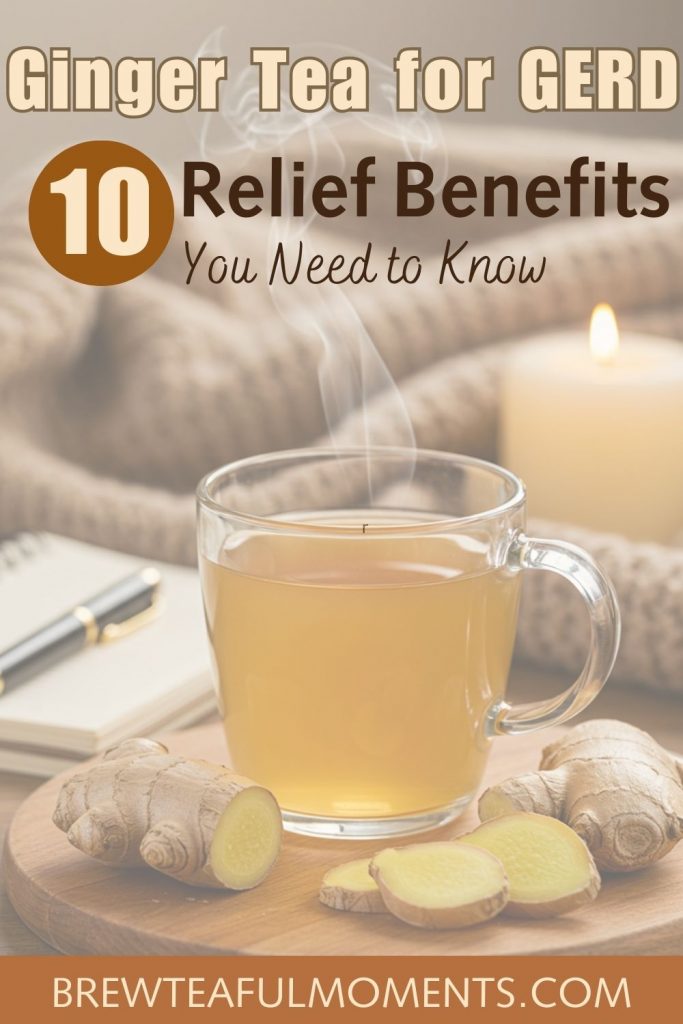Check out my #1 recommended ginger tea!
Learn MoreWe often hear that ginger tea is the “magical drink” that helps relieve GERD or Gastroesophageal Reflux Disease.
But how exactly?
In this post, we’ll explore 10 ways ginger tea may provide relief and promote better digestive health.
Table of Contents
Understanding How Ginger Tea Affects GERD
1. Anti-Inflammatory Effects of Ginger Tea on GERD
One main benefit of drinking ginger tea lies in its anti-inflammatory properties.
These anti-inflammatory properties are attributed to compounds like gingerol and shogaol.
You can read this article to know more.
To make the whole picture easy for you, imagine your esophagus as a pipe.
In GERD, this “pipe” becomes irritated and inflamed because stomach acid keeps flowing back into it, like a leaking pipe corroded over time.
Ginger, with its anti-inflammatory properties, acts like a soothing balm for this irritation.
It reduces inflammation by calming the swelling and redness inside the esophagus, making it less sensitive to acid.
Additionally, it soothes the irritation much like applying ointment to a burn, easing discomfort and promoting healing.
This is especially important because inflammation in GERD can weaken the lower esophageal sphincter (LES).
LES is the muscle like a “valve” that prevents acid reflux.
By reducing inflammation, ginger supports the LES, helping it function more effectively and prevent acid from flowing back up. In simpler terms, just as ginger tea soothes a sore throat, it can also calm and heal an irritated esophagus.
2. Ginger Tea Prevents Gas, Bloating, and Improves Digestion
Ginger tea can promote healthy digestive systems.
Here’s how it does it.
Think of your digestive system as a conveyor belt at a factory, steadily moving food along so it can be broken down and absorbed.
Sometimes, this conveyor belt slows down or gets jammed, leading to bloating, discomfort, or that heavy feeling after eating.
Ginger acts like a skilled technician for this system, getting everything moving smoothly again.
First, ginger stimulates digestive enzymes, which are like the workers on the conveyor belt.
These enzymes break food down efficiently, making the process quicker and easier.
Second, ginger helps muscles in your stomach and intestines contract properly, much like fixing a motor to keep the belt running at the right speed.
This is especially helpful for preventing that sluggish, stuck feeling after a meal.
Ginger also helps manage gas, which can build up like air bubbles in the system, causing bloating and discomfort.
It acts like a release valve, easing the pressure and letting your system settle.
Whether you’re feeling bloated or your digestion feels off-track, ginger works behind the scenes to keep everything running like a well-oiled machine. If your digestive processes are promoted, the likelihood of acid reflux after meals is reduced.
3. Ginger Helps Reduce Stomach Acid Production
Imagine your stomach as a bubbling pot of soup.
When it produces too much acid, it’s like the soup boiling over, leading to discomfort, heartburn, and even acid reflux.
Ginger tea acts like turning down the heat on that pot.
And prevent excess stomach acid production.
Ginger contains compounds that naturally calm the digestive system, signaling the stomach to produce just the right amount of acid.
This helps maintain a healthy balance, preventing that “boiling over” effect.
By soothing the stomach lining and regulating acid levels, ginger tea not only eases symptoms like heartburn but also creates a more comfortable environment for digestion to work smoothly.
4. Ginger Tea Helps Soothe Nausea
Another great thing about ginger tea for GERD is that it can help reduce nausea.
Imagine nausea as a stormy sea in your stomach, with waves of unease crashing in and making you feel miserable.
Ginger tea acts like an anchor, calming those rough waters and bringing the storm under control.
Ginger contains natural compounds called gingerols and shogaols that help relax the stomach muscles and improve digestion, preventing that churning feeling.
It also communicates with your brain’s nausea control center, reducing the signals that trigger vomiting.
Whether it’s motion sickness, morning sickness, or an upset stomach, a warm cup of ginger tea works gently yet effectively to settle your stomach and restore balance, letting you feel like yourself again.
5. Ginger Tea Improves Food Absorption
Another amazing thing about ginger tea is that it can help boost your nutrient absorption.
Here’s how it work.
Think of your digestive system as a sponge, soaking up nutrients from the food you eat.
Sometimes, that sponge isn’t as effective as it should be, leaving valuable nutrients behind.
Ginger tea acts like a booster for that sponge, improving its ability to absorb what your body needs.
By stimulating the production of digestive enzymes, ginger tea helps break down food more efficiently.
Making sure that nutrients are released and absorbed into your bloodstream.
It also promotes better circulation in the digestive system, creating the ideal environment for absorption.
Check out my #1 recommended ginger tea!
Learn MoreIn recent study, ginger supplementation was shown to enhance iron absorption and thus increase oral iron therapy’s efficacy.
With ginger tea in your routine, your body gets more out of every meal, leaving you feeling energized and nourished.
6. Ginger Tea Promotes Gastric Emptying
For those with GERD, ginger tea may help with stomach emptying and reduce acid reflux symptoms.
Here’s how it works.
Imagine your stomach as a storage container that needs to empty its contents at the right pace to avoid overflow.
For GERD patients, when food stays in the stomach too long, it can create pressure and push acid back into the esophagus, causing discomfort.
That’s where ginger tea comes in.
It acts like a helpful assistant, speeding up gastric emptying to keep everything flowing smoothly.
Ginger stimulates the muscles in your stomach, encouraging them to move food into the small intestine more efficiently.
This reduces the chance of food lingering and causing acid buildup.
By facilitating gastric emptying, ginger tea helps alleviate the pressure that contributes to acid reflux, offering relief and promoting a healthier digestive rhythm for GERD patients.
7. Ginger Tea is Packed with Antioxidants for GERD Management
The antioxidants in ginger may protect against chronic diseases and promote healthy aging.
This indirectly supports digestive health by reducing oxidative stress in the body.
In simple terms, here’s how ginger antioxidant content helps patient with gerd:
Think of your body as a fortress, constantly under attack by harmful molecules called free radicals, which can worsen inflammation and damage tissues, including the esophagus in GERD patients.
Ginger tea is like a team of skilled defenders, packed with antioxidants that neutralize these free radicals and protect your body from further harm.
For GERD management, these antioxidants play a crucial role in reducing oxidative stress.
Oxidative stress is increasingly recognized as a significant factor contributing to chronic inflammation in the esophagus, particularly in conditions like gastroesophageal reflux disease (GERD) and Barrett’s esophagus (BE).
By calming inflammation and supporting overall cellular health, ginger tea not only soothes discomfort but also helps your body heal and strengthen its defenses against acid reflux.
8. Ginger Tea Provides Warmth
Sipping warm ginger tea can create a comforting effect that may help soothe the stomach and esophagus, providing quick relief from discomfort associated with GERD.
Imagine GERD discomfort as a cold, unsettled feeling in your chest and stomach, leaving you tense and uneasy.
Ginger tea provides a gentle warmth that feels like wrapping yourself in a cozy blanket, instantly soothing that discomfort.
The heat from ginger tea helps relax the muscles of the digestive tract, easing tension and promoting better movement of food through the system.
At the same time, ginger’s natural anti-inflammatory properties calm irritation in the esophagus caused by acid reflux.
Ginger tea gives warmth and makes you feel better, making it a comforting remedy, offering GERD patients relief while helping to restore balance to their digestive system.
9. Ginger Tea as a Natural Remedy for Heartburn
Some GERD patients may experience heartburn.
And to combat heartburn, many people find that ginger tea serves as an effective home remedy for heartburn.
It provides relief without the side effects often associated with over-the-counter medications.
Imagine heartburn as a fiery, uncomfortable sensation rising in your chest, caused by stomach acid creeping up into the esophagus.
Ginger tea acts like a natural fire extinguisher, gently calming the flames and providing relief for GERD patients.
Ginger’s anti-inflammatory properties help soothe the irritated lining of the esophagus, reducing the burning sensation that comes with heartburn.
It also promotes healthy digestion, which prevents acid from lingering in the stomach and backing up into the esophagus.
By drinking ginger tea, GERD patients can experience a natural and effective remedy to calm heartburn, offering comfort without the need for harsh medications.
10. Ginger Tea Supports Overall Digestive Health
Incorporating ginger tea into your diet may promote better overall digestive health.
It potentially reduce the frequency and severity of GERD symptoms over time.
Think of your digestive system as a complex network of highways, all working together to transport food, nutrients, and waste.
For GERD patients, the roads can sometimes become blocked or slow, leading to discomfort and acid reflux.
Ginger tea acts like a helpful traffic controller, ensuring everything moves smoothly and efficiently.
By promoting healthy digestion, ginger tea helps keep the digestive system functioning optimally.
It supports the production of digestive enzymes, aids in gastric emptying, and calms inflammation, all of which contribute to smoother digestion and a healthier gut.
For GERD patients, this means less pressure in the stomach, reduced acid reflux, and overall digestive health.
With ginger tea, you’re giving your body the support it needs to maintain a balanced and well-functioning digestive system.
How to Make Ginger Tea for GERD Relief (5 Easy Steps)
Making ginger tea at home is simple and allows you to control the ingredients for maximum benefit.
Here’s a quick recipe:
Ingredients:
- 1-2 inches of fresh ginger root, sliced or grated
- 2 cups of water
- Optional: a slice of lemon or a teaspoon of honey (if tolerated)
Instructions:
- Boil the water in a saucepan.
- Add the ginger and reduce the heat to a simmer.
- Let it steep for 10-15 minutes.
- Strain the tea into a cup and add lemon or honey if desired.
- Enjoy warm, sipping slowly to maximize its soothing effects.
Precautions and Side Effects
While ginger tea is generally safe, it’s important to consume it in moderation.
Excessive ginger intake may lead to side effects like heartburn or upset stomach.
Stick to 1-2 cups per day and consult your doctor if you’re on medications, as ginger can interact with blood thinners and other drugs.
Conclusion
Ginger tea offers a natural, soothing solution for managing GERD by reducing inflammation, regulating stomach acid, and promoting healthy digestion.
Its anti-inflammatory, antioxidant, and digestive benefits work together to alleviate common GERD symptoms like heartburn, bloating, and nausea.
By enhancing nutrient absorption, speeding up gastric emptying, and providing a comforting warmth, ginger tea supports overall digestive health, offering relief and preventing flare-ups.
Regularly incorporating ginger tea into your routine can help create a more balanced, well-functioning digestive system and improve GERD symptoms over time.
Love this post? Share it on your favorite board!

Check out my #1 recommended ginger tea!
Learn MoreThis is for informational purposes only. For medical advice or diagnosis, consult a professional.


